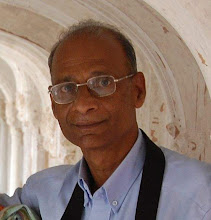These are parts of Ayurdays, which I wrote when I was treated a decade earlier. Now that I am undergoing similar treatment, I blog a few pieces.
A GAME OF CARDS
Playing cards is a usual method of time pass. Three or four patients sometimes sit around a medicine stand and shuffle the cards. Rummy is the favourite game. Played in a relaxed pace, one by one the cards settle in groups of thirteen like the pebbles gathered on the riverbank by little village urchins while waiting idly for their playmates.
The kings and queens and jacks mingle with common numbers and sit in groups waiting to be picked up by a player. The royalty which lost its place in politics now continue their presence in games and jokes. Some simple cards, which gain consequential importance, would start leading the formation of groups in parallel or sequential orders. Players select them through a simple instant process of wishful calculation. In many cases it is just a random selection. Like in a blind act, the player pulls out a card, places it at a suitable end and rearranges the whole hand.
How did a six of clubs or ten of hearts gain such superiority, such a special importance that the player prefers this particular one over the rest? Or does any preference matter at all? Whatever wilful selection the man does is limited to the set of thirteen cards. They are already selected for him. Both the player and his cards are selected and played by some invisible one. The fate[s] of the clubs- six, hearts- ten, the player and even the bystanders are all just some thoughts in a universal mind, some say. Not a casual whim but a part of an all inclusive, all integrated, all considered plan. Not the leela. But a purposeful act. What purpose? Just be sure there is a purpose and it will be revealed to you, they say.
Thirteen cards are grouped at random. About each group sits a man. The fate of this man vis-à-vis this game is decided by the combination of cards in this set. The earlier they fall into a sequential order, the luckier is the player. The application of his ability is limited to the discovery of such orders and the formulation of groups of three and four. Like in an industrial unit of 13 workers; the easier they fall into a productive order, the luckier is the investor. The better the grouping and deployment of the men, the better the profits. Who chooses the men? The investor? Yes Sir, but they are already chosen for him. His choice is limited exactly like the choice of these players. Then what is the difference between work and play?
Then what is the difference between a purposeful plan and wanton leela?

No comments:
Post a Comment